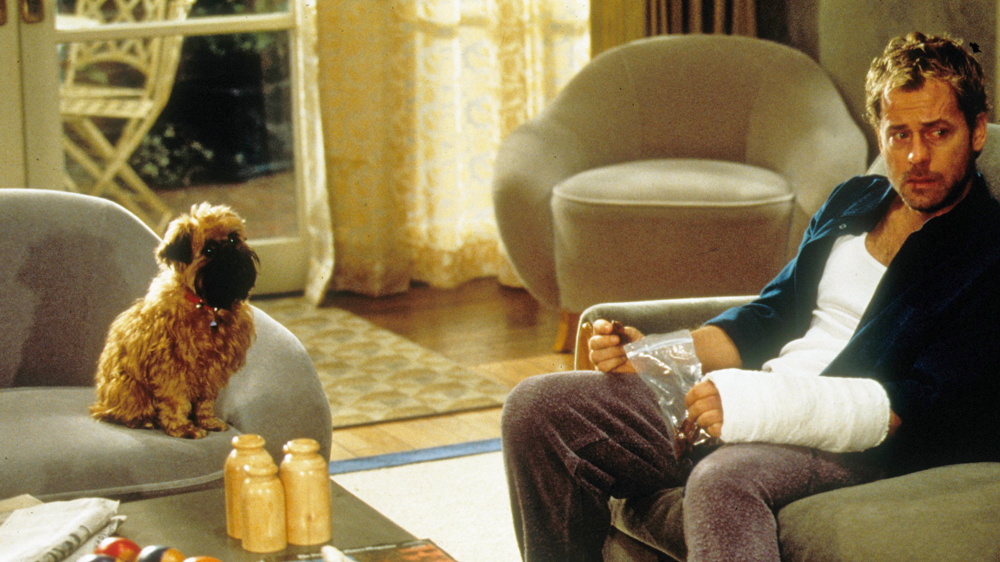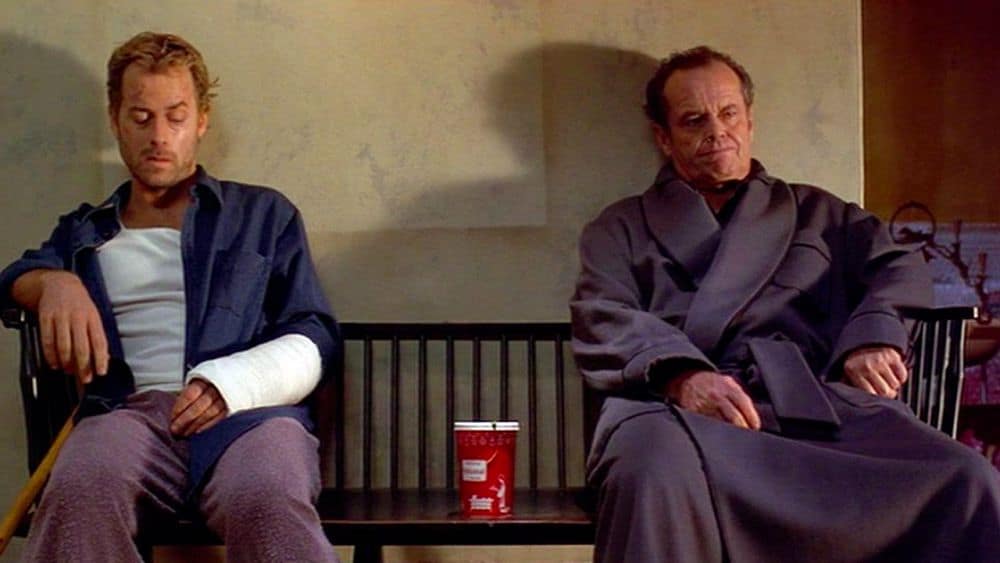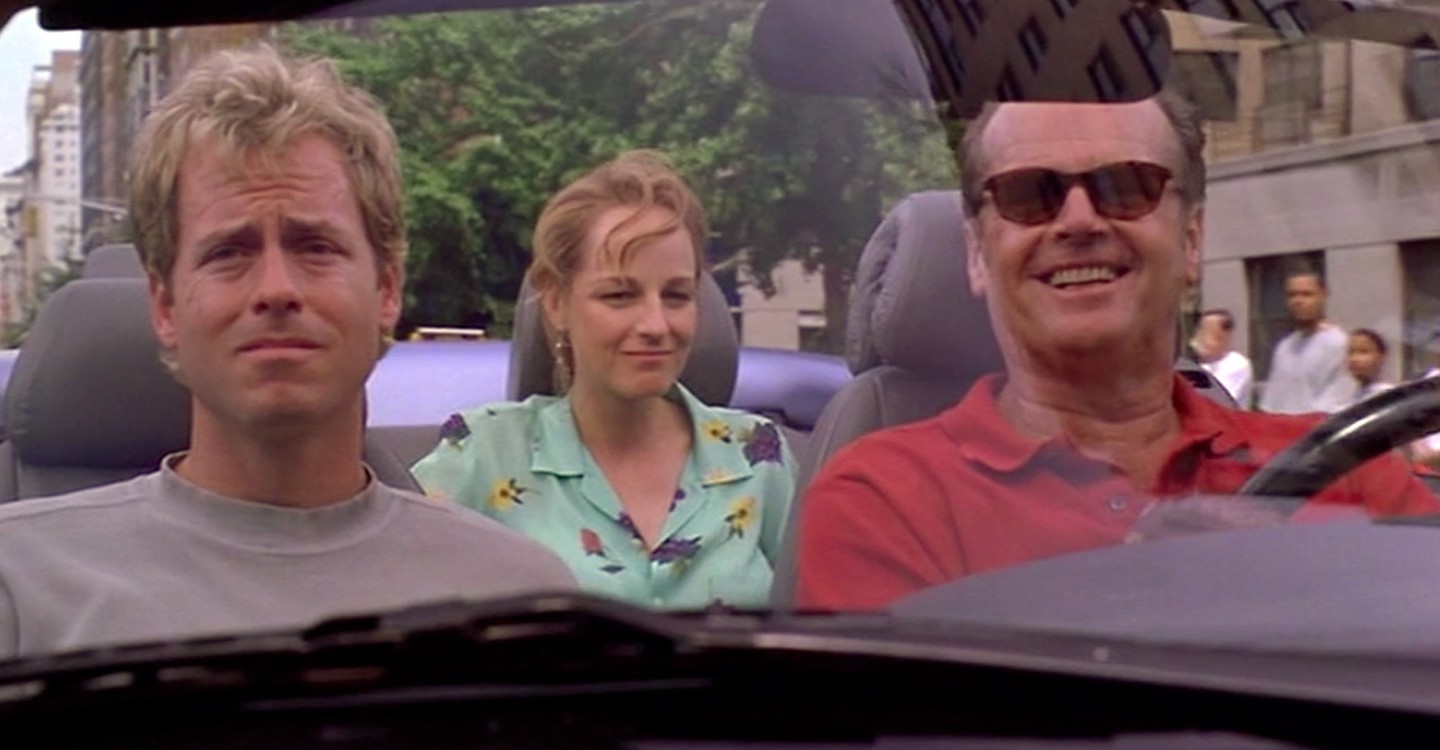a series by Christopher James looking at the 'Gay Best Friend' trope
 Turns out, gay best friends can get Oscar nominated too. They just have to get beat up first.
Turns out, gay best friends can get Oscar nominated too. They just have to get beat up first.
Happy Oscar Hangover Week! Now is a time to rejoice in the winners we love and lick our wounds from the snubs along the way. In honor of the Oscars, we thought we would look back at a nominated example of the “Gay Best Friend.” We don’t often see Gay Best Friends get Oscar nominations or wins. Since this caricature is used more as window dressing and less like a fully developed character, there often isn’t enough meat for an actor to get awards traction. Even if they are a scene stealer, they often will fall short. That is… unless trauma is involved.
Case and point: the 1997 Best Supporting Actor race. Our first entry in the column was about the formative work of Rupert Everett in the hit rom-com My Best Friend’s Wedding. His George still stands as one of the best examples of the “gay best friend,” as he elevated the trope and crafted a fan favorite character. Some pushed for him to be nominated for Best Supporting Actor, but there was only room for one gay character in the category. Instead, Greg Kinnear showed up in the Oscar lineup for his mincing performance as Simon in As Good As It Gets, a gay artist defined by his trauma. Dear Oscar, is that really as good as it gets for this category?
 A tale as old as time - crotchety old man and his gay neighbor.
A tale as old as time - crotchety old man and his gay neighbor.
Melvin Udall: Never, never, interrupt me, okay? Not if there's a fire, not even if you hear the sound of a thud from my home and one week later there's a smell coming from there that can only be a decaying human body and you have to hold a hanky to your face because the stench is so thick that you think you're going to faint. Even then, don't come knocking. Or, if it's election night, and you're excited and you wanna celebrate because some fudgepacker that you date has been elected the first queer president of the United States and he's going to have you down to Camp David, and you want someone to share the moment with. Even then, don't knock. Not on this door. Not for ANY reason. Do you get me, sweetheart?
Melvin Udall: Okay then.
Simon Bishop: [clears his throat] Uhm, yes. It's not a... subtle point that you're making.
James L. Brooks’ Oscar winning dramedy centers around Melvin Udall (Jack Nicholson), a sexist homophobic misanthrope suffering from obsessive compulsive disorder. He spends his day making everyone around him miserable, including his gay artist neighbor, Simon (Greg Kinnear). One day, while doing a portrait of a local gay hustler he thinks is an actual model, Simon finds his home robbed by a bunch of his subject’s friends. Once he catches them in the act, Simon is brutally beaten nearly to death. This vicious gay-bashing is the inciding incident in Melvin’s journey to being a kinder person, as he is asked to take care of Simon’s dog, Verdell.
It’s a testament to Jack Nicholson that he can vary the way he hurls horrific insults at people and still maintain charm. I was not trying to be snarky about that either. His performance manages to be charismatic and interesting even as he is saddled with a broadly sketched portrait of OCD behavior that too often equates it with bigoted language. He never shies away from the character’s bad behavior, but somehow makes us believe that people may want to save him from himself. Still, there’s something incredibly gross about how the film uses Simon’s tragedy as the impetus for Melvin’s growth. Even before the assault on Simon, the movie asks us to laugh at him simply because he’s gay. We’re always seeing Simon and the rest of the cast through Melvin’s perspective in the beginning, rather on their own terms. To Melvin (and by extension the audience), Simon is a mincing fairy with a tiny dog, a vaguely defined art career and an inability to stand up for himself. Kinnear overplays Simon’s sincerity, making him appear not just weak, but also not dynamic or fully rounded as a character. It’s as if he was told to “play gay,” rather than “play a character.”
Simon Bishop: Is this fun for you? You lucky devil. It just keeps getting better and better, doesn't it? I'm losing my apartment, Melvin. And Frank, he wants me to beg my parents, who haven't called me, for help. And I won't. And... I... I don't want to paint any more. So the life that I was trying for, is over. the life that I had is gone, and I'm feeling so damn sorry for myself that it's difficult to breathe.
The basic framework for As Good As It Gets involves watching characters’ plights get progressively worse until they learn to be happy in spite of their circumstances. This means each character must continually get put through the emotional wringer, wallowing in added layers of trauma. Melvin’s love interest, his favorite waitress Carol (Helen Hunt in her Oscar winning performance), continually struggles with “those HMO bastards” to help her sick son. For Simon, he recovers from his injuries only to have scars all over his face and lasting injuries to his arm and leg that prevent him from painting. With no way to earn money and pay off the $61,000 in hospital bills, he’s left with a terrible choice. He can either leave his apartment or beg his homophobic parents for money.
Simon’s entire existence in the film revolves around trauma. Perhaps this is why it was the gay character they chose to reward with an Oscar nomination. However, a person is not solely defined by their trauma. The mental scars from being beaten by one’s own Father would likely never go away. It makes sense that Simon would not have dealt with these feelings and feel haunted by them. Yet, this trip to Baltimore feels more like a plot device to further the A plot of the film, Melvin and Carol’s love story.
Contextually, the Oscars had rewarded such films as Philadelphia and Longtime Companion that dealt with the AIDS epidemic. Yet, films that were about gay joy, such as The Birdcage, did not see similar embraces from the Oscars. There’s much more to gay characters than past and current traumas. Simon represents a one dimensional creation, a character that can withstand hit after hit only to serve the protagonist’s emotional journey. You can beat the gay up all you want as long as it makes Melvin want to be a better man. Jack Nicholson gives a great performance because he’s allowed to explore the softer side of a bitter man. There’s a lot to play between these two poles, and he takes advantage of it. Meanwhile, Greg Kinnear minces and sulks in the side.
 Who's third-wheeling who?
Who's third-wheeling who?
Simon Bishop: I have to draw you.
Carol Connelly: No, no no, absolutely not. I'm a lot more shy than people think. I give off the wrong impression.
Simon Bishop: I have to. I haven't sketched anything in weeks.
Carol Connelly: Stop staring. Do a vase.
Simon Bishop: But you're beautiful, Carol. Your skin, your long neck, the back, the line of you. You're why cavemen chiseled on walls.
Carol Connelly: [Smiles, and laughs slightly] All right, cut me a break.
[as Simon draws, she smiles, and lowers her towel, giving him a better view]
Carol Connelly: [after a brief cutaway to a different scene, returning to this one; now Carol is laying on a couch, nude, laughing, as Simon draws] I'm sorry, I don't care how you put this, we're being naughty here, pal.
Simon Bishop: No, no, this is, this is great.This is so great. I swear to God, my hand won't even keep up. Hold it. Hold it.
When Simon sees Carol in the bath, he compulsively starts drawing her. Soon, they are thrashing around the bed as he sketches faster than seems humanly possible. While this feels like a cathartic release, in many ways it's also a regression. He may be Melvin’s gay best friend, but he’s a stand-in for Carol’s son. When he sees her by the bath, he’s instantly transported to when he used to draw his Mom naked and it spurs him to create art again. Once one scratches the surface only slightly, they can see that this is a pretty unhealthy dynamic to get back into. Instead of moving forward, he just wants to re-enact what he used to do with his mother growing up.
The only time we’ve seen Simon happy so far is re-enacting the bond he had with his Mom. These memories are the only positive things we’ve heard about his life through this two hour and fifteen minute movie. He left his house at 18 and never came back, but his adulthood seems to not have shaped him or had any impact. Simon is only defined as “gay,” but within that there are so many subgroups. Is he a party gay going to clubs? Does he have a more close knit group of friends? What are his feelings around AIDS? Does he have any thoughts about the gay community or gay lifestyle? Hell, what type of guy is he even into? Simon is given no sex drive and no interests. He likes art, his dog, and the nude memories of his Mom. For these sins, he must be beaten almost to death, get into extraordinary debt, have his dog prefer the homophobe next door and be forced to drive to visit his homophobic parents to beg for money.
Simon Bishop: I love you.
Melvin Udall: I tell you, buddy... I'd be the luckiest guy alive if that did it for me.
Sketching Helen Hunt’s naked body gives Simon the strength to not beg his parents for money. The motley trio can head back to New York, with Simon none the richer. Melvin offers his empty room to Simon, which Simon readily accepts. If these two crazy cats can get along, can’t we all? Let’s be honest, what is Melvin going to do if Simon brings a guy home? The movie allows everyone to kiss and make up, but it doesn’t actually give Simon much in the way of character growth. He gets progressively sadder until he does a full 180 at a moment’s notice. This is all in service of doing the one thing all gay best friends do… give his friend a pep talk before the big declaration of love. Simon’s growth is just a means to an end of giving Melvin and Carol a happy ending.
Previously in Gay Best Friend
pre stonewall
- Plato (Sal Mineo) in Rebel Without a Cause (1955)
- Sebastian Venable in Suddenly Last Summer (1959)
- Calla Mackie (Estelle Parsons) in Rachel Rachel (1968)
post stonewall
- Erich (Norbert Weisser) in Midnight Express (1978)
- Toddy (Robert Preston) & Squash (Alex Karras) in Victor/Victoria (1982)
- Dolly Peliker (Cher) in Silkwood (1983)
1990s and the 2000s
- Tim (Nathan Lane) in Frankie & Johnny (1991)
- Hedy (Jennifer Jason Leigh) & Graham (Peter Friedman) in Single White Female (1992)
- Sammy Gray (Steve Zahn) in Reality Bites (1994)
- Gareth (Simon Callow) and Matthew (John Hannah) in Four Weddings and a Funeral (1994)
- Jane (Whoopi Goldberg) in Boys on the Side (1995)
- George Downs (Rupert Everett) in My Best Friend’s Wedding (1997)
- George Hanson (Paul Rudd) in The Object of My Affection (1998)
- Bill Truitt (Martin Donovan) in The Opposite of Sex (1998)
- Robert (Rupert Everett) in The Next Best Thing (2000)
- Patti (Sandra Oh) in Under the Tuscan Sun (2003)
- Damian (Daniel Franzese) in Mean Girls (2004)
- Nigel (Stanley Tucci) in The Devil Wears Prada (2006)
- Wallace Wells (Kieran Culkin) in Scott Pilgrim vs the World (2010)
the now